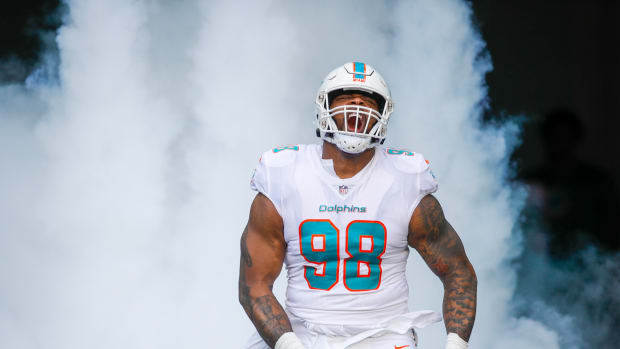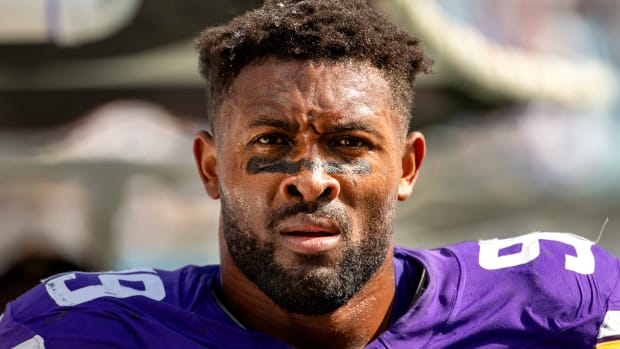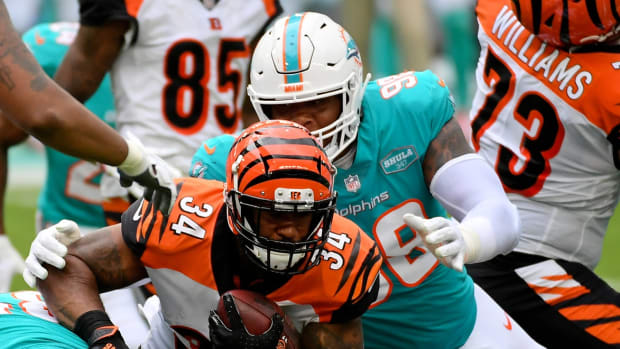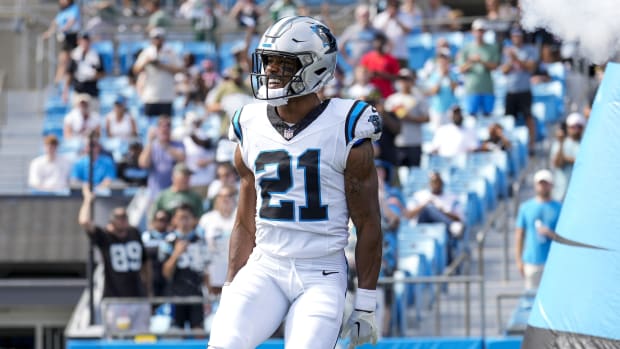How the NFL Gets Covered and Consumed
I’m writing this week while recovering from arthroscopic shoulder surgery. I needed to have my rotator cuff re-accommodated, but don’t think about putting me on the IR list . . .
In one of my lives outside of The MMQB, I am the executive director of the Jeffrey S. Moorad Center for Sports Law at Villanova’s law school. There, I recently hosted our annual Moorad Symposium, an event that explores some of the leading issues in sports. This year’s symposium—Sports, Media and Millennials—addressed the evolving landscape of consumer demand brought on by increasing options, as well as the challenges brought on by social media. As a nod to our readers, I thought I would share some compelling excerpts from the panels.
One panel featured The MMQB editor-in-chief Peter King, Jane McManus of ESPN/espnW, former 60 Minutes correspondent Jack Ford and Meet the Press host Chuck Todd (a huge Packers fan, by the way).
Here are some highlights:
On the challenges of using social media . . .
Todd: When I got this job with Meet the Press, it became different. I’ve actually changed the way I tweet because I don’t like to become a story. News organizations cover the media looking to exploit something, so that Bill O’Reilly or Fox and Friends will do a segment on me, or whatever. And it’s going to be a distraction; it’s going to cause heartburn. So I’ll be honest, I’ve added a filter on politics. But I now have a better understanding of what it’s like to be a public official. I have a little more empathy.
I hate that I do this. I miss the first three or four years on Twitter, when it felt like we’re all having a conversation. My favorite time to be on Twitter is at 4:30 a.m. when I get up; it’s the ultimate wire service at that time; it becomes less readable and more opinionated as the day goes on.
• ANDY BENOIT: Inside the Film Room With . . . Solomon Thomas
King: I’m going to be myself, and I’m not going to be the AP Style Book. I’m going to watch a game and see Odell Beckham Jr. act like a turd, and I’m going to comment, “Odell Beckham Jr. is acting like a turd right now.”
I am often asked, “Do you regret the Roger Goodell chili photo?” Of course I do. In 2010, we were in Cincinnati and I was doing a long profile for Sports Illustrated. I mentioned to Goodell that I love Skyline Chili (I lived in Cincinnati for five years). So we went there, his minions took a picture, I’m wearing a chili bib with Roger Goodell, so I’m in bed with Roger Goodell. That picture has haunted me for the last seven years.
It’s quite an uncivil atmosphere on Twitter. But, again, it’s not really going to change the way I am.
McManus: I think honestly it’s sharpened us as a profession, where you have to be aware of how your stuff is going to sound. I think fairness is the most important thing; cheap shots are not professional.
People are passionate about sports. It’s all evolving, what makes our audience want to tune in, and to stoke the things that do and to put aside the things that don’t. So we have to figure out how we’re going to walk that line between having a voice that is more than just what appears under our byline and still being professional about the way that it’s being delivered.
On the challenges of opinion-based journalism . . .
Ford: What I have seen in the last 10 years is that opinion, sadly, is absent of, or unmoored to, facts. People realized very quickly if they said something in 20 to 30 seconds and said it really loud, somebody would put them on the air. How do we continue to drive conversation with opinion, which we need to do, but determine that those opinions are indeed moored, in some way, shape or form, to real facts?
Here is an example: right before the college football championship between Clemson and Alabama, I heard people say, “They are not real students. We shouldn’t call them student-athletes.” Well, here are a couple facts: there were 27 graduate students on the field; Clemson was No. 2 in the country (after Stanford) in graduation rate; Alabama was No. 7. In the football building at Clemson the first sign you see is, “In the last six years, 124 of 131 players have graduated.”
That’s a really good story, but nobody ever talks about it, just because it doesn’t bleed. So it’s not going to lead.
• EMILY KAPLAN: Corey Davis Has Become the Draft’s Mystery Man
King: When you read Monday Morning Quarterback you’re usually going to get some opinions out of me about things that are not about football. And that’s just the way it’s grown over the last 20 years.
I’d feel awful if I ever got out of this business someday and the prevailing opinion on me was, “Oh, he always had his favorites. And he always did it this way.” I want my reputation whenever I leave this business to be, “He sought the truth.” Regardless of how it’s done, whether you periscope the truth, tweet the truth, video the truth. It has to be the truth.
I asked Todd about this unique time in presidential coverage, and being tweeted at by the President (“sleepy eyes”) . . .
TODD: I did do a sub-tweet that day.
Again, I don’t want to become part of the story. I’m covering the story that’s in front of me, not the story that I want to have in front of me. People will say, “Why is your program so biased?” And I will say, “Well, are you watching with an objective eye or a subjective eye? Are you looking for information or affirmation?” I do buy into the fact that at the end of the day you control your credibility, so I just do my best to practice what I’m preaching.
President Trump is certainly in tune with the short-attention-span culture, and self-aware about who he is. He says, “I don’t like to have a plan for the day. I like to react.” Well, Twitter is the ultimate reaction machine, which is why in many ways he’s so effective at using it. He knows that he can distract Morning Joe for two hours with one tweet at 6:15 in the morning. And at the same time, our responsibility is to cover the President. And he is in some ways more effective at it than we are covering it.
And finally, I asked Todd on lessons learned in the recent election cycle . . .
TODD: A colleague of mine reminded me of this day during the healthcare debate: “500 reporters on Capitol Hill covering that story, and probably four that were out in Rolla, Missouri, or in some other town wondering how is the new healthcare bill going to impact them.” We have to guard against is this idea of no longer doing experiential journalism.
The reason we lost credibility with rural America is we didn’t go and tell their stories. If you’re not out there just telling the stories of all Americans, suddenly the barstool guy is more credible because at least he is talking about people that live in his community.
* * *
Another panel featured media executives talking about their challenges and opportunities in these ever-changing times. The panelists: Jon Wertheim, executive editor of Sports Illustrated; Eric Johnson, executive vice president of ESPN Global Sales; and Erika Nardini, CEO of Barstool Sports.
Here are their thoughts:
On brand identity . . .
Wertheim: Our ongoing challenge is: how do you retain your identity and your authenticity and then also find new opportunity? I mean, if Sports Illustrated said, “You know, enough with the Stanley Cup. We’re going to do E-sports.” I think it wouldn’t come across as authentic. It’s a constant challenge to balance how you stay with your core principles, your storytelling, not dilute the brand but at the same time not stay where you are?
• ROBERT KLEMKO: Cyril Grayson Sprints Into the Unknown
Johnson: Yeah, think about the most important sub-brand we have, which is SportsCenter. It had to be redefined because of how people consume highlights. And we’ve gone very personality-oriented. We want to hear what Michael and Jemele have to say about this issue versus needing to see highlights of what that was.
Nardini: I think we are “the next” because the subjects that we cover, we don’t treat it as sacred. And I think it’s hard when you have a very established brand, when you’re dealing with the leagues. I’m bullish about Barstool because stoolies—our audience—are very much a part of our brand. I believe all future brands will be socially distributed, experiences that travel through social.
On consumer demand . . .
Johnson: 96% of our content is consumed live. So the rest of the marketplace is going to a time-shifted advertising model, and ESPN has been very focused on just live.
Consumers now want to be in control, and curate in their own way, and personalization is key. They’re just spending less time on an individual basis, but they’re spending more in number of times that they are coming to consume within the day. And we think about that as a way to, one, publish content, and two, create revenue opportunities from that.
• ALBERT BREER: Dean Blandino Leaves. Who Wants to Step Into the Fire?
Wertheim: A fan’s relationship with sports and teams and athletes has radically changed in the last few years. I think the way fans are consuming sports, not just on their phones versus on their televisions, but just emotionally as a philosophical.
Nardini: What we care about is that it’s funny, and that people like it. And we have 22 guys who make collectively 150 pieces every day, just trying to be funny. From my standpoint, we want to grow that sweet demographic that everyone else wants to grow as well. What we’re really interested in is just engagement.
You can view all the panels from this year’s symposium, including those on NCAA issues (with NCAA executive vice president Oliver Luck) and E-sports (with Activision/Blizzard senior vice president Mike Sepso) here.
* * *
Finally, echoing so many sentiments around the NFL about the passing of Dan Rooney . . .
Rooney was one of the owners who hired me, as a 28 year-old player agent, to be general manager of the Barcelona Dragons in the NFL’s World League. I hardly knew him but had represented a couple of low-level Steelers’ players, and I guess I had made an impression. As inexperienced as I was, Rooney believed in me.
• PETER KING: Dan Rooney—For the Good of His Team, and the Game
I always think one of the best ways to judge people is to see how they treat people who can do nothing for them, those beneath their “station” in life.
At NFL gatherings—whether league meetings, games or other events—I noticed many owners and league executives would only speak or socialize with those of their ilk. Dan Rooney was different: he would treat those under the ownership level, such as myself, with the same engagement and focus that he would afford to his fellow owners. That was rare. Dan Rooney did not have an entitled bone in his body.
• Question? Comment? Story idea? Let us know at talkback@themmqb.com






































